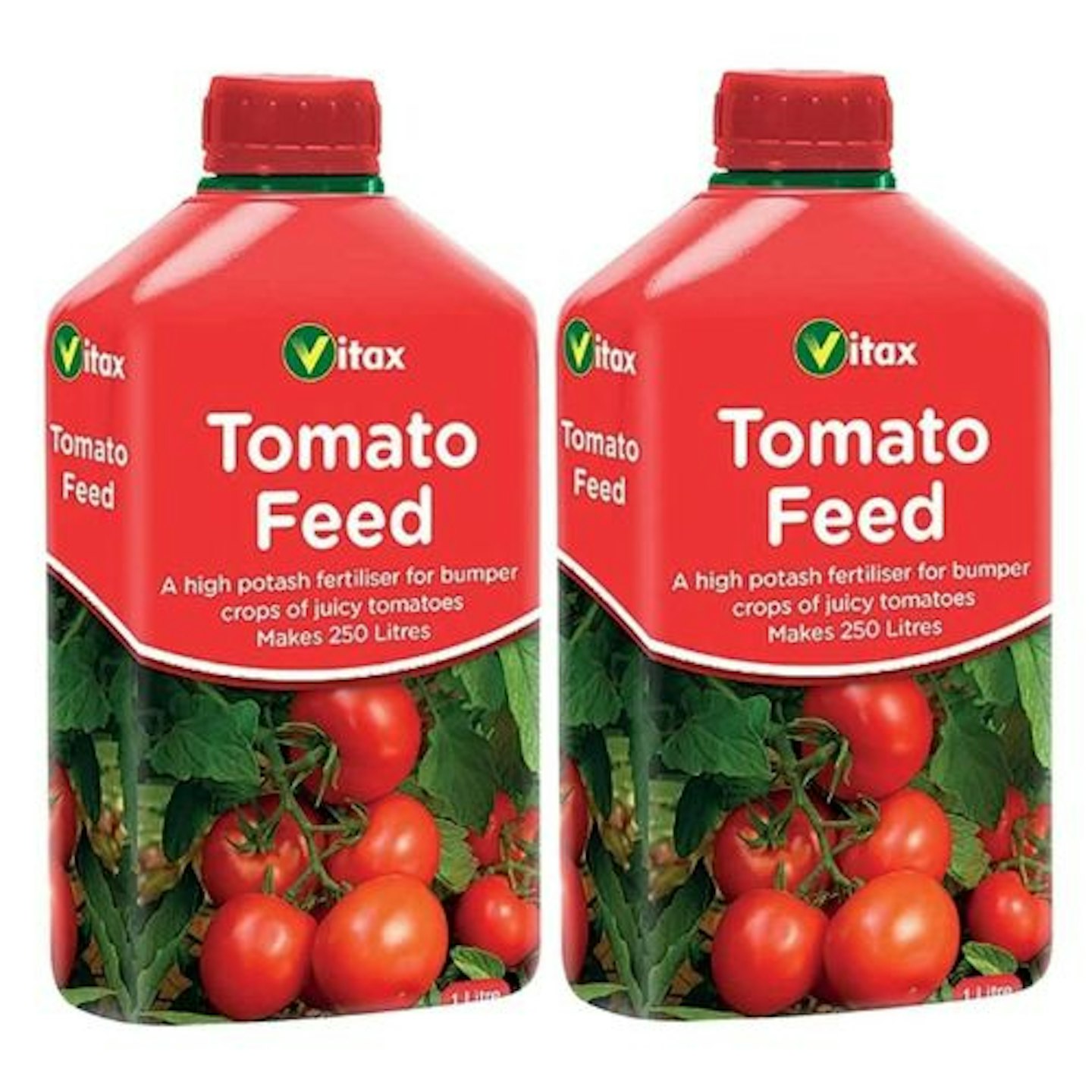Ensuring you have the best food for plants to keep your flowers, fruits, vegetables, and other garden plants healthy is a must. It's essential for anything you're going to grow in a contained environment to make sure they're getting all the must-need nutrients. Plus, you can feed some to outdoor plants to give them a boost, too.
We all know that plants need the right amount of light and water to grow, but if you want to give them a helping hand, food for plants will work wonders. Mature plants will benefit from supplementary feeding during the growing season. Liquid plant food (diluted with water) or controlled-release fertilisers (in pellet form) can be used to give plants nutrients. Whether you're growing flowers in a window box or outdoor plants in containers, feed them two or three times during their blooming period.
Best food for plants at a glance:
Outdoor shrubs will benefit from a slow-release NPK fertiliser, applied in the spring ahead of the growing season. This is simply a mix of Nitrogen, Phosphorus and Potassium in a concentrated form that gives plants the essential nutrients for growing. These chemicals are naturally present in soil, however, some soil types are sometimes lacking. For an organic fertiliser, apply well-rotted leaf mould, compost or manure. Fruits and vegetables need a slow-release fertiliser that's rich in potash.
Indoor greenery needs plant food that is not going to attract bugs or have a potent smell, so it's best to buy a fertiliser that's designed for indoor use. It will contain Nitrogen, Phosphorus and Potassium to give plants the essential nutrients that they cannot otherwise get. House plants do not need feeding often in winter but will benefit from a feed every two weeks during spring and summer.
Best food for plants
Best food for plants overall
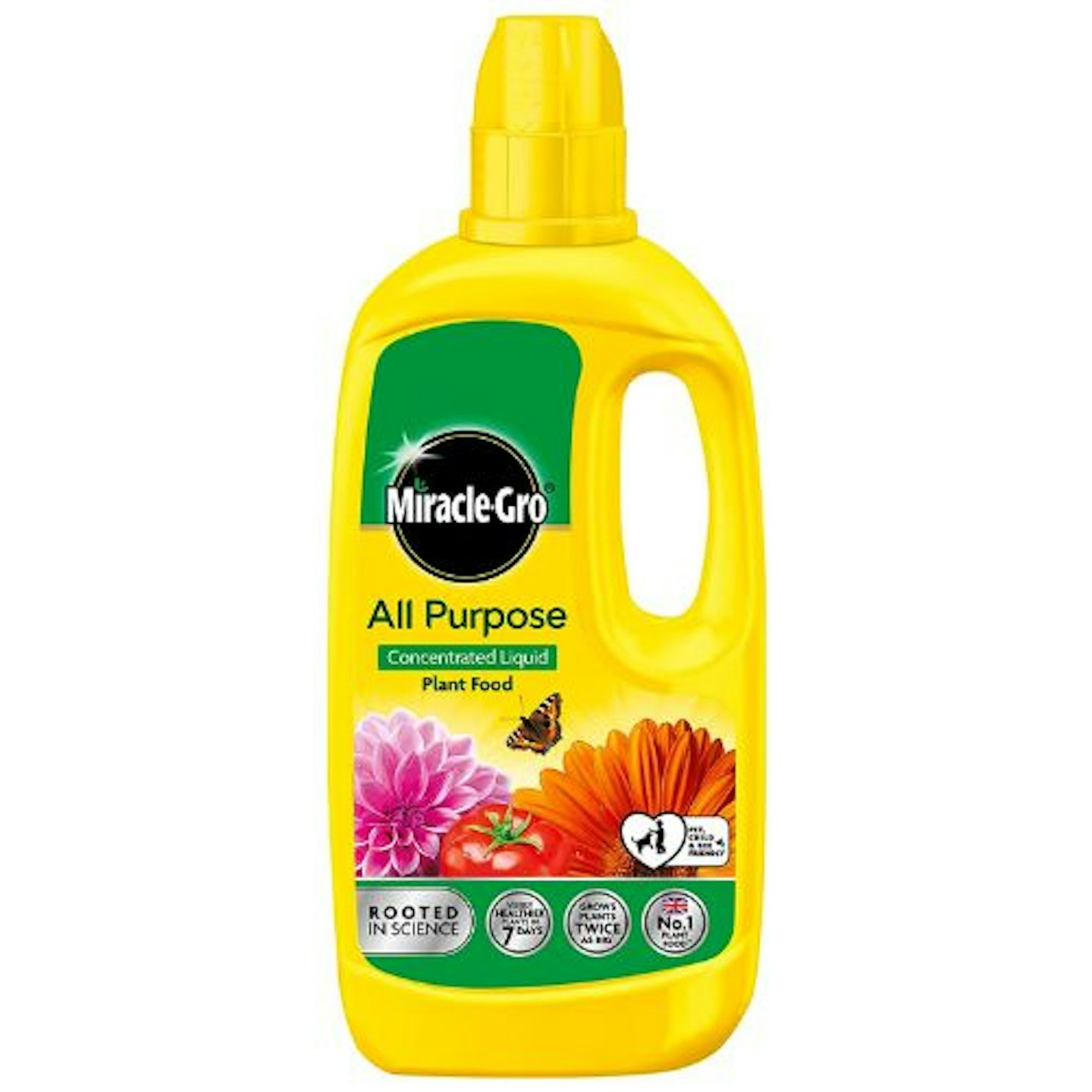 Amazon/Miracle Gro
Amazon/Miracle GroThe Miracle-Gro All Purpose Concentrated Liquid Plant Food will help you create a wonderful green oasis full of vibrant blooms in no time at all. This food contains a growth stimulant that will encourage plants, flowers and vegetables to shoot up, aid root formulation, and improve resistance to environmental stresses. This currently has an impressive 4.6-star Amazon rating from 13,000 reviews.
Pros
- Claims visible results in just seven days
- Renowned for its 'grows twice as big' results
Cons
- Needs to be used every one-to-two weeks while plants are actively growing
Best plant food for long-term results
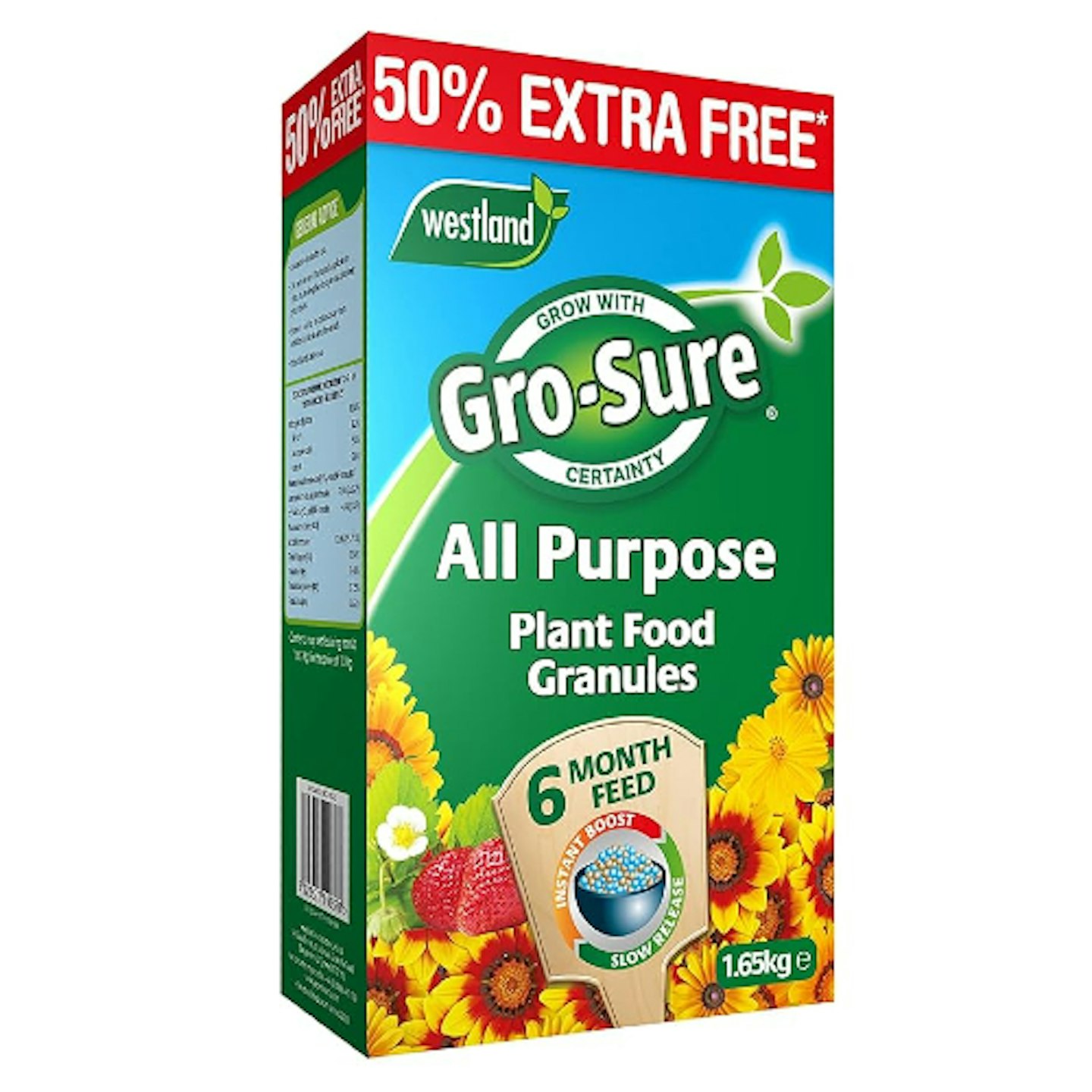 Amazon/Westland
Amazon/WestlandJust one application of the Gro-Sure 6 Month Slow Release Plant Food will provide your plants with all the additional nutrients it needs for the whole growing season. It is ideal for feeding in pots, containers, beds, borders and hanging baskets and is suitable for use with all non-ericaceous plants. Reviewers recommend mixing some of these granules into the soil when you are potting or re-potting.
Pros
- Gives plants an instant boost and then slowly releases nutrients for six months
- Promotes healthy foliage and long-lasting blooms
Cons
- Not designed for fast results
Best plant food for tomato plants
Need a helping hand to grow your tomatoes? This Vitax Ltd Liquid Tomato Feed will do the trick. Available in packs of one, two or three bottles, you can get the amount to suit the total number of plants you have on-the-go and get it delivered to your door the very next day if you're an Amazon Prime member. This comes as a twin-pack which will make 500 litres of liquid feed.
Pros
- Can be used for growing indoor or outdoors
- Perfect product for a healthy crop
Cons
- Some reviewers reported slow progress
As well as the right food, you'll want to make sure you've got the perfect starter trays, compost, and pots for producing your own toms. Take a look at our 'how to grow tomatoes at home' buyer's guide for expert advice and product recommendations.
Best plant food for indoor and outdoor use
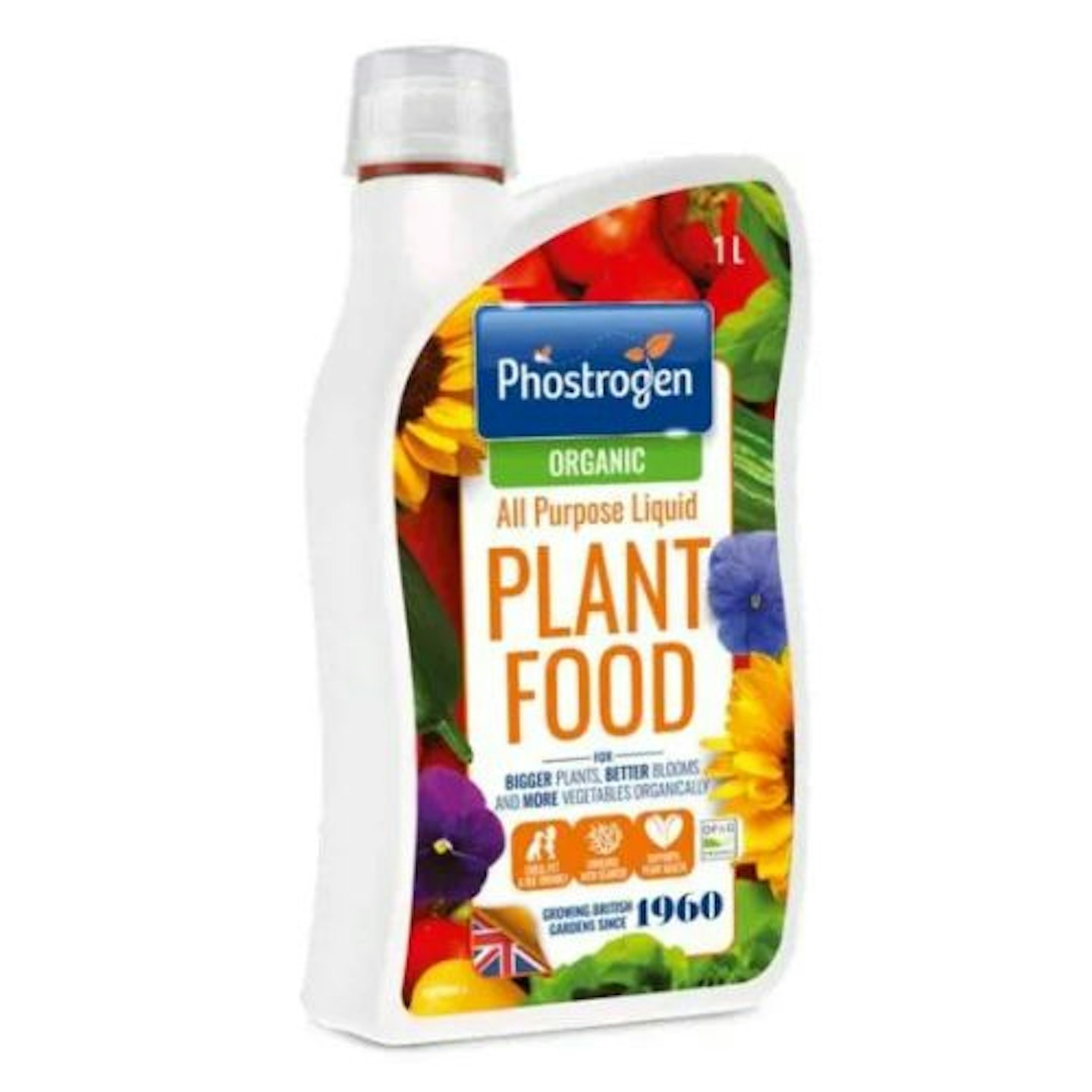 Amazon/Phostrogen Organic
Amazon/Phostrogen OrganicEndorsed by the OFG, the Organic Farmers & Growers Association, the Phostrogen Organic All Purpose Liquid Plant Food helps to develop flowers and fruit to be the biggest and best they can be. It's enhanced with seaweed and is packed with all the essential nutrients your plants need to bloom to their full, colourful potential. It's worth noting this can also work to make plants more drought resistant.
Pros
- Perfect for both indoor and outdoor plants
- Can be used on baskets, beds and borders
Cons
- Can be fiddly and messy pouring the solution into the cap to measure the correct amount needed
Best single houseplant plant food
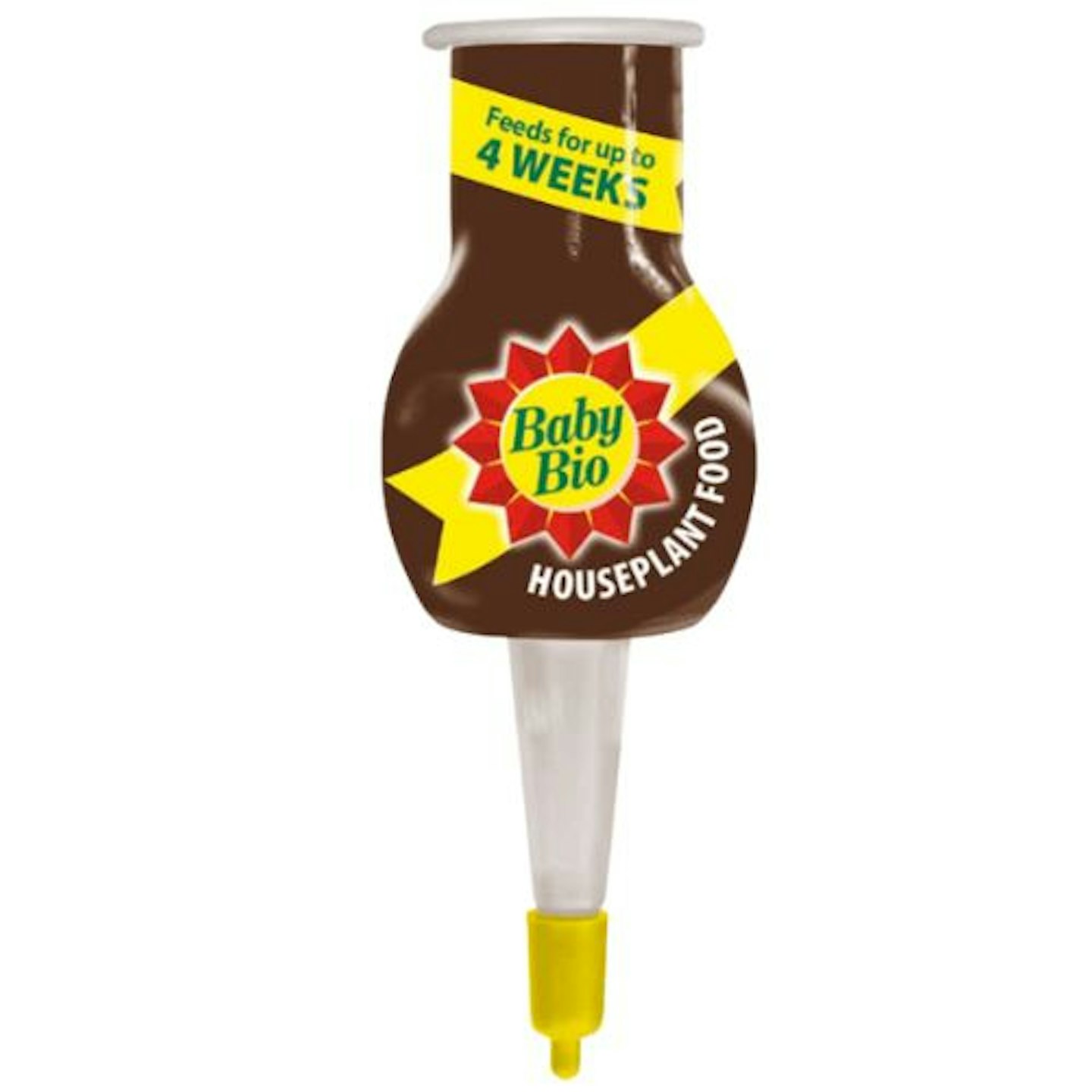
www.wilko.com
If your favourite houseplant is in need of a bit of TLC, you need to get the Baby Bio Original Food Single Drip Feed. You just simply snip off the tip, push into the soil and water as usual and you'll notice your plant turn from sad to perky in a week or two. It's designed to help produce greener leaves and a more vibrant colour. One bottle should last around four weeks.
Pros
- This is a ready to use solution
- Provides a nutritious feed for a month
Cons
- Single plant application only
Best plant feed for results
 B&Q/Verve
B&Q/Vervewww.diy.com
Improved root initiation and growth, better stress tolerance and increased crop yield are just some of the benefits you'll experience using the Verve Universal Liquid Plant Feed. It contains many beneficial trace elements, natural hormones, and proteins for boosting plant and soil health to provide a nutrient-rich feed, thanks to the added seaweed. This should be administered with a watering can.
Pros
- Ideal for general outdoor plant use
- Improves root initiation and growth
Cons
- You need to make sure you wash your hands thoroughly after use to avoid irritation
Best indoor plant food for convenience
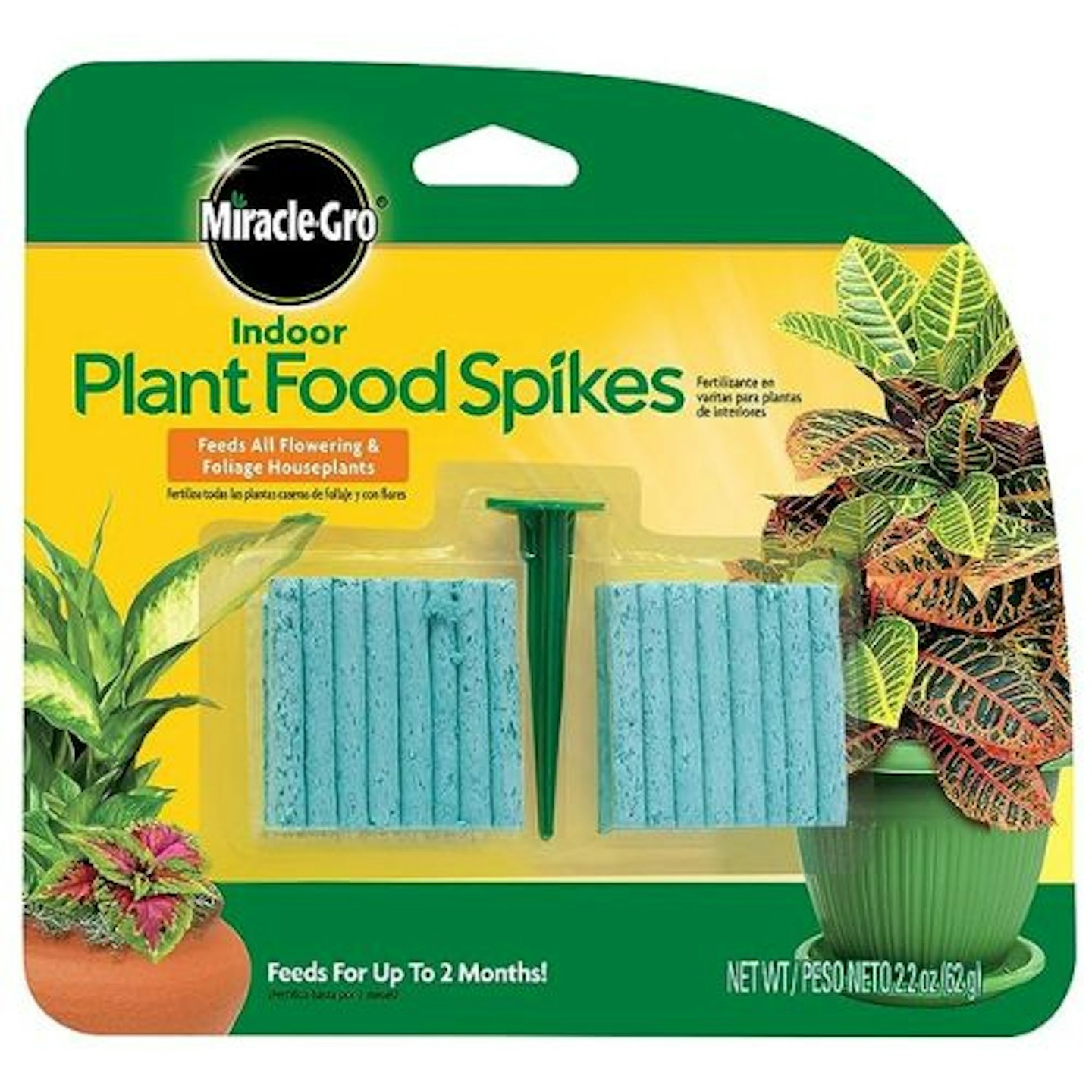 Amazon/Miracle-Gro
Amazon/Miracle-GroSee visibly healthier plants for up to two months with Miracle-Gro Indoor Plant Food Spikes that slowly release nitrogen, so you don't have to worry about remembering to feed your plant babies, although they will obviously still need watering. Happy reviewers comment that their indoor plants are thriving after using this convenient and cost-effective fertiliser.
Pros
- Enormous number of reviews and Amazon's Choice recommended
- Convenient feeding solution
Cons
- Some customers comment that it was not effective on their plants
Best plant food for hanging baskets
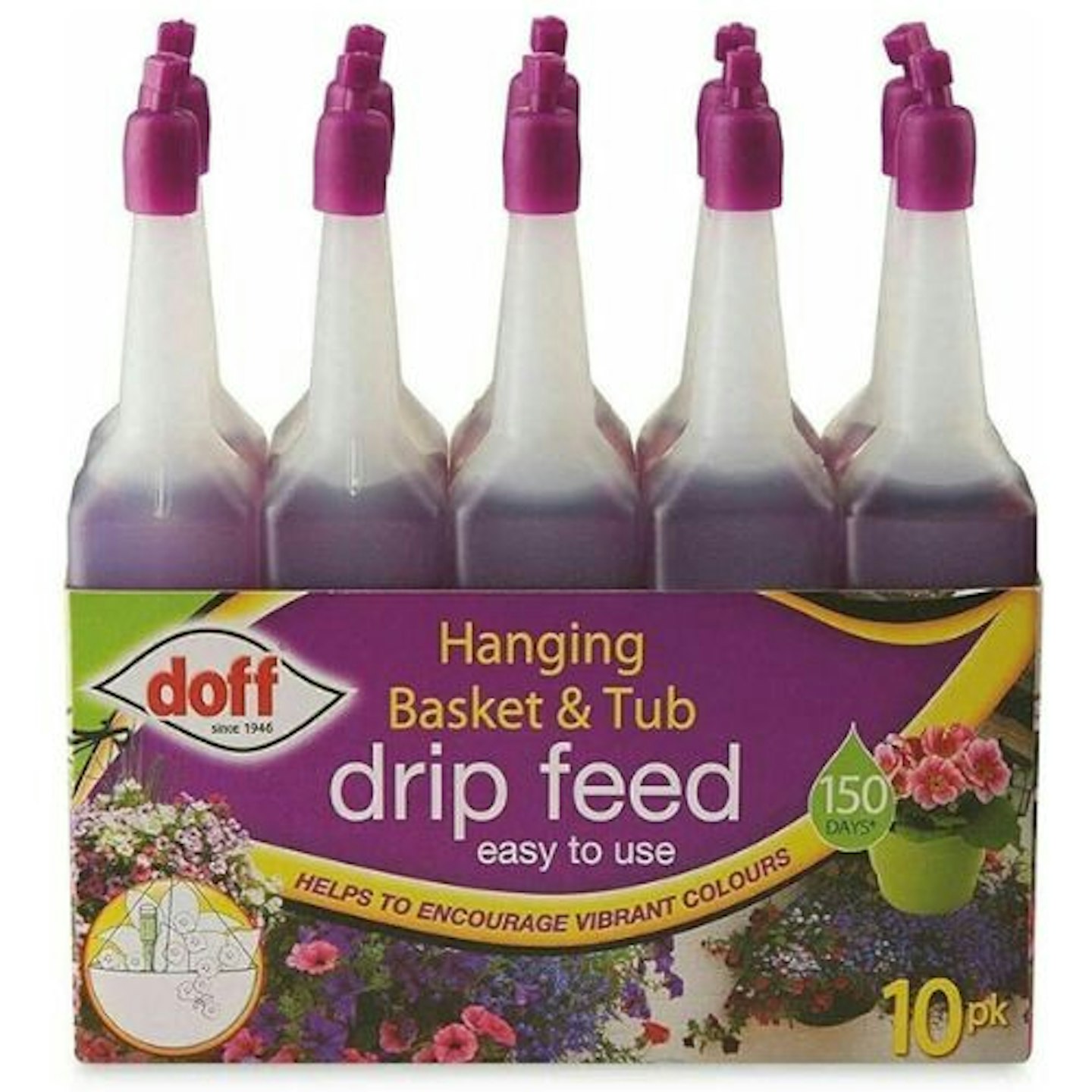 Amazon/Doff
Amazon/DoffThis easy-to-use Doff House Plant Drip Feed can be discreetly stuck into the soil of a container plant or hanging basket, and it will feed flowering plants for up to 15 days so is a great option to keep your hanging baskets blooming when you're on holiday. It saves you the faff of having to remember to feed them. Users say that this pack of drip feeders is good value for money and perked up their plants.
Pros
- Get healthier plants with minimum effort
- Practical for hanging baskets
- Multipack is value for money
Cons
- Customers comment that the feed either comes out too quickly or needs coaxing out
Best multi-purpose indoor plant food
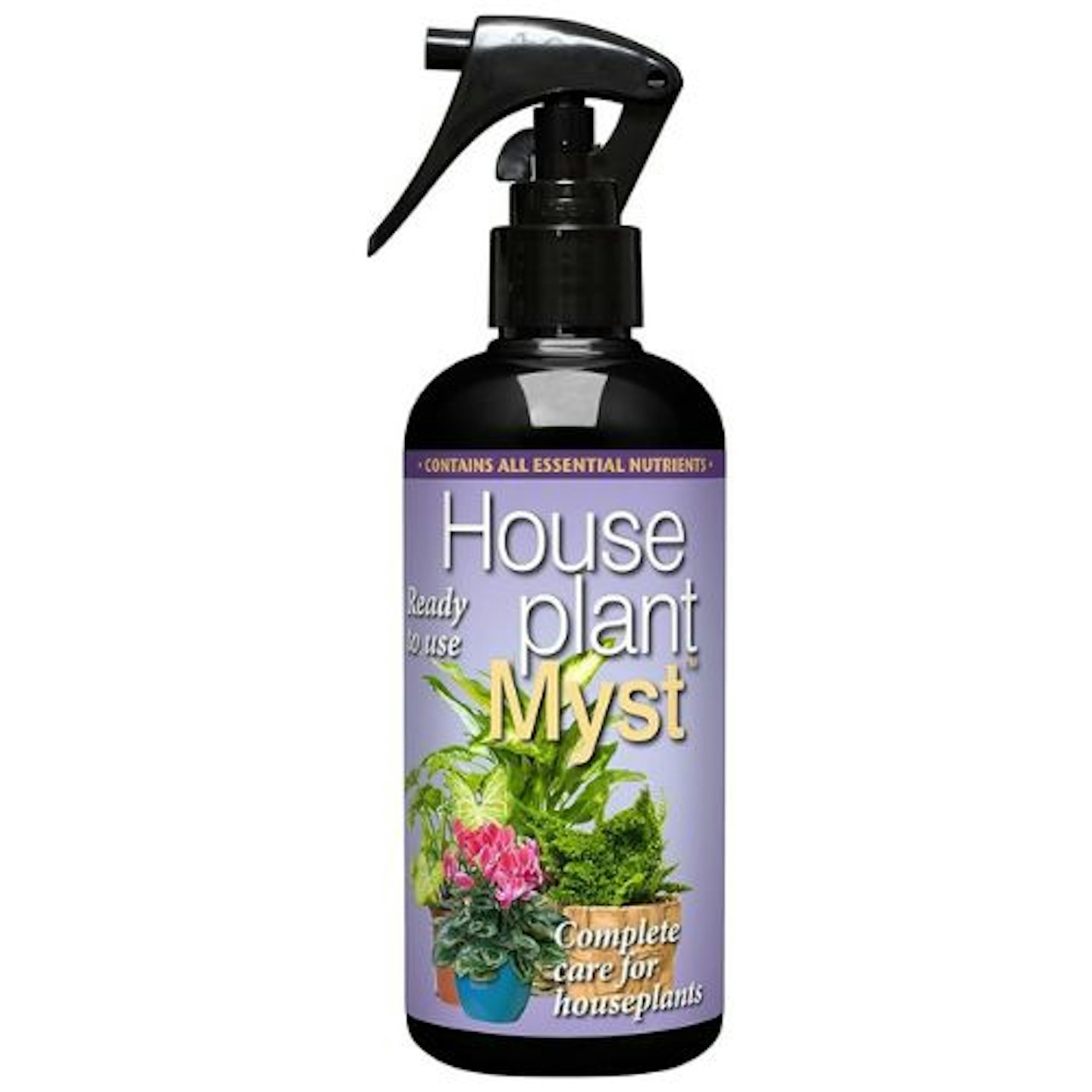 Amazon/Growth Technology
Amazon/Growth TechnologyHouseplant Myst contains a comprehensive mix of organic nutrients and it can be used on a wide range of houseplants, including succulents. There's marine plant extract, humic and fulvic acid, and pure plant oils included in the ingredients. In addition to enhancing growth, this spray can actually repel pests. It's recommended you use this around two to three times a week.
Pros
- Amazon's Choice recommended
- Feeds houseplants and repels pests
- Gives a fast-acting boost to plants
Cons
- Some customers comment that it wasn't effective
How we chose the best plant food
All of these plant foods have been hand-selected by our team of Modern Gardens shopping experts. We carefully considered their practicality, effectiveness and value for money in our selection of the best. Our team has spent hours investigating and researching plant food to make it easier for you to find the very best, and we'd never recommend a product we don't believe in.
Where possible, we also test and share the latest and best products you should know about. And with help from Modern Gardens Magazine, Garden News and Garden Answers, we share expert gardening knowledge to help you get the most from your product.
Plant food FAQs
How do I give my houseplants a nutrient boost?
Your indoor houseplants will benefit the most from being fed plant food as they require a bit more TLC to keep them healthy and happy. Modern Gardens expert garden writer Jules Barton Breck advises:
Most potting composts only contain a limited amount of nutrients, which are used up after six to eight weeks. So once your houseplant is growing, from spring onwards, it will do better if you feed it with a fertiliser.
Aim to feed in spring and summer, reducing to half the amount in autumn and nothing in winter. The trick is to feed regularly, rather than giving your plant loads in one lot as it can cause it to go into shock. If you’re not sure how much to feed, less is always better!
Easy ways to feed:
Fertiliser sticks: If you’re a houseplant owner who’s simply thankful that your plants survive, use fertiliser sticks such as Miracle Gro Indoor Plant Food Spikes in spring and summer. Make a hole in the soil then poke in a stick and it will feed the plant for up to two months.
Liquid feed: If you’re pretty good at remembering to water your plants then this is the way to go. Try Baby Bio Original Plant Food – simply add 5-10 drops to 500ml water every time you give your plants a drink, or mix half a capful in a litre of water and feed every two weeks. Alternatively, make it easier on yourself and use a Baby Bio Original Food Single Drip Feed.
Drip feeder: Somewhere in-between in the houseplant TLC stakes? Try a liquid drip feed such as Doff House Plant Drip Feed. Just cut off the tip of the cap and invert into the plant pot and each bottle will provide a balanced feed for your plant for 15 days.
Mist feeder: If you regularly mist your plants then you can also feed them through their leaves, as long as they’re not hairy and it’s not a flowering plant. Try Houseplant Myst, spraying 8-10 squirts onto the leaves once a week.
When is it best to start feeding plants?
Ensure your seeds and seedlings get off to the best start in life by providing them with all the key nutrients they need to flourish. Just bear in mind that young plants need a weaker dilution of plant food so it doesn't damage their roots. Plants around eight weeks old will benefit from feeding every two weeks during the growing season.
Not sure when you should feed your plants? Miracle-Gro has some tips that will help you know what signs to spot and the best time of year to start.
When should I add fertiliser to soil?
Miracle-Gro recommend preparing your garden or pots in early spring, or whenever the last frost is. By feeding your plants the moment you plant them, you can give them a strong start by giving them the vital nutrients they need directly at their roots.
Already established perennial flowers and herbs will also need food for plants as they begin to emerge at the start of the growing season. This is to encourage a healthy growth. You'll just want to be careful not to disturb the roots or any new growth that has already started to come through.
How often should I feed outdoor plants?
Plants experience a burst of early growth when they're first planted, but you'll want to ensure they can keep up that momentum throughout the year. By feeding them regularly, even in summer, you'll replenish the nutrients they need throughout the growing season. This will coax your plants into growing their best and producing the biggest blooms and harvest.
What are the signs that a plant needs feeding?
If your plants are starting to have pale or yellowing foliage, fewer flowers, droopy, limp or weak stems, and just showing general signs of slower growth than usual, you may have a hungry plant on your hands. These are all signs that the soil is short on the nutrients you need, and if you've been watering regularly and haven't had problems with insects or disease, chances are your plants need feeding.
Is food for plants necessary?
Plant food is used to improve growth and ensure brighter, more vibrant blooms and greenery, but you may be wondering whether plant food is necessary if you're making sure they have enough water and light in the first place.
Food for plants may not be needed if the soil is rich enough in all the nutrients your plant needs to stay healthy. However, contained plants in pots and hanging baskets, for example, tend to soak up these nutrients more quickly than those in beds and borders. So, because of this, you may find that these need more of a helping hand to replenish what has been lost from the soil. And if you notice any of the signs of a hungry plant we mentioned in the FAQ above, that will be your cue to feed it.
How else can I help my indoor plants flourish?
In addition to regularly feeding your precious plants, there are two small investments you can make to help them thrive. Consider a special plant lighting solution to give them brighter conditions, especially useful during the winter months. A plant humidifier is also a strong option to keep your plants happily hydrated.
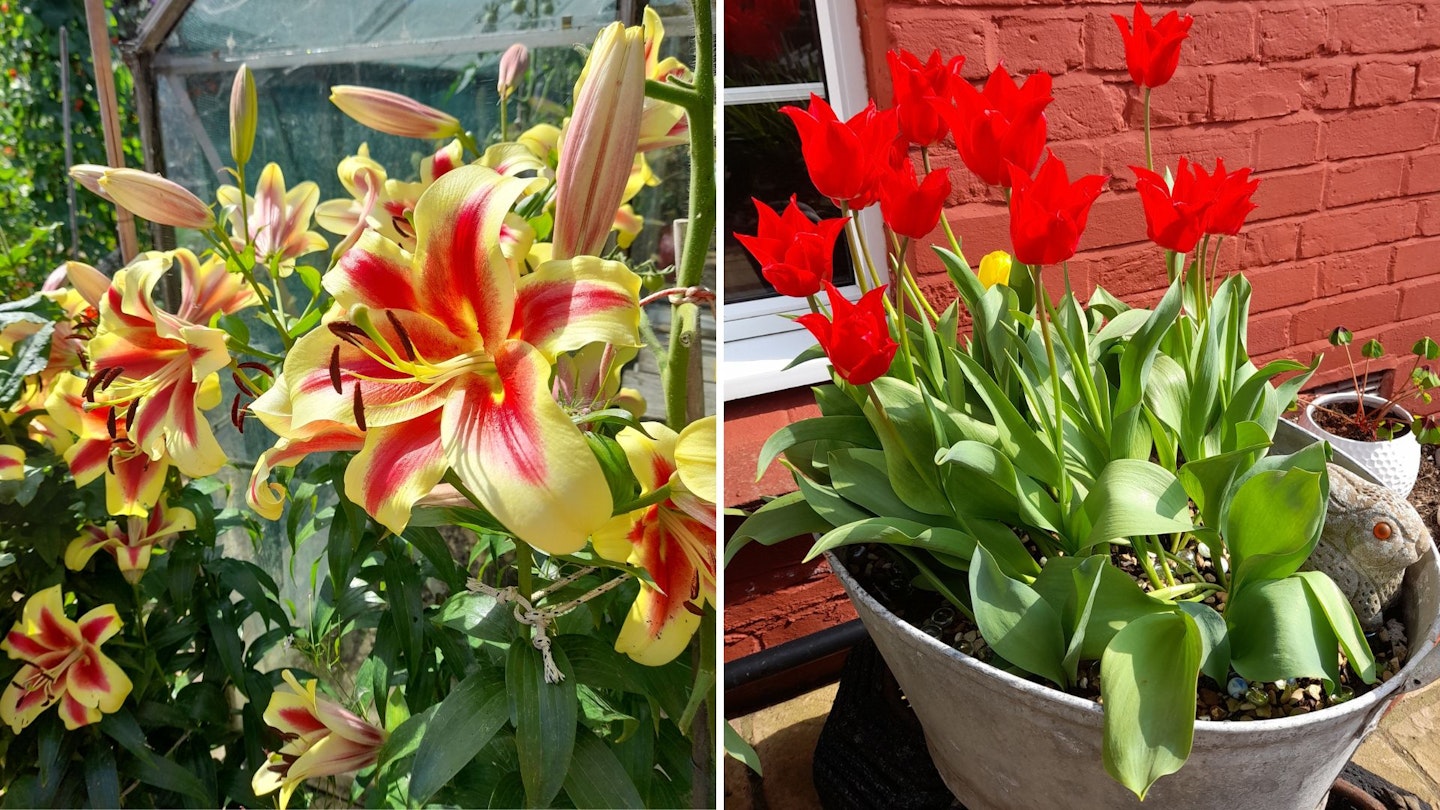
What to read next:
Subscribe to Modern Gardens magazine and get the most out of your outdoor space. Discover everything you need to know to make your outside space look fantastic, quickly and easily, with hundreds of simple ideas, designer tricks, affordable products and expert advice in every issue of Modern Gardens. View our latest subscription offers to save on shop prices.
Rosie Floyd is a Senior Home, Pets & Garden Product Writer for Modern Gardens, specialising in outdoor living. Before joining the team at Bauer, Rosie spent almost three years writing content for a garden buildings company so knows her stuff about garden sheds, rooms and offices and how to make the most of your outdoor space.

